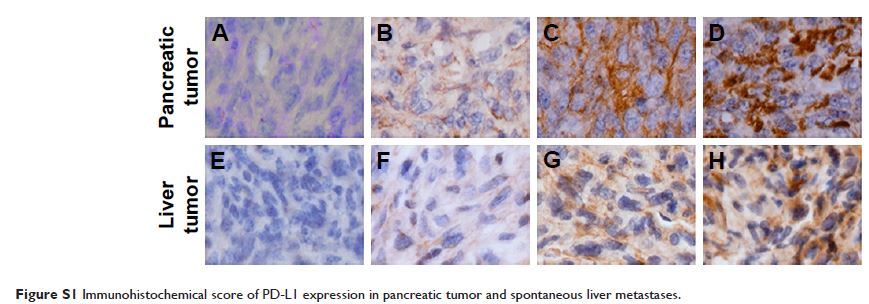109568
论文已发表
注册即可获取德孚的最新动态
IF 收录期刊
- 3.4 Breast Cancer (Dove Med Press)
- 3.2 Clin Epidemiol
- 2.6 Cancer Manag Res
- 2.9 Infect Drug Resist
- 3.7 Clin Interv Aging
- 5.1 Drug Des Dev Ther
- 3.1 Int J Chronic Obstr
- 6.6 Int J Nanomed
- 2.6 Int J Women's Health
- 2.9 Neuropsych Dis Treat
- 2.8 OncoTargets Ther
- 2.0 Patient Prefer Adher
- 2.2 Ther Clin Risk Manag
- 2.5 J Pain Res
- 3.0 Diabet Metab Synd Ob
- 3.2 Psychol Res Behav Ma
- 3.4 Nat Sci Sleep
- 1.8 Pharmgenomics Pers Med
- 2.0 Risk Manag Healthc Policy
- 4.1 J Inflamm Res
- 2.0 Int J Gen Med
- 3.4 J Hepatocell Carcinoma
- 3.0 J Asthma Allergy
- 2.2 Clin Cosmet Investig Dermatol
- 2.4 J Multidiscip Healthc

PD-L1 阻断通过 PI3K/AkT/MTOR 信号通路在小鼠胰腺癌原位移植模型中产生抗肿瘤和抗转移作用
Authors Zhao L, Li C, Liu F, Zhao Y, Liu J, Hua Y, Liu J, Huang J, Ge C
Received 17 December 2016
Accepted for publication 8 March 2017
Published 12 April 2017 Volume 2017:10 Pages 2115—2126
DOI https://doi.org/10.2147/OTT.S130481
Checked for plagiarism Yes
Review by Single-blind
Peer reviewers approved by Dr Akshita Wason
Peer reviewer comments 3
Editor who approved publication: Dr Carlos Vigil Gonzales
Background: Pancreatic cancer is one of the most aggressive and intractable
malignant tumors, and most deaths from pancreatic cancer are related to
metastases. It has been demonstrated in vitro that overexpression of programmed
death-ligand 1 (PD-L1) correlates with a lack of phosphatase and tensin
homologue (PTEN) expression in pancreatic cancer tissue. This loss of PTEN
expression may aberrantly activate the phosphatidylinositol 3-kinase
(PI3K)/Akt/mammalian target of rapamycin (mTOR) pathway, and thereby promote
tumor cell survival, proliferation, and disease progression. In this study, we
investigated the potential therapeutic effect of blockading PD-L1 expression on
the progression of pancreatic cancer and its spontaneous liver metastases in
vivo by inhibiting the PI3K/Akt/mTOR signaling pathway.
Methods: We investigated the effect of blockading PD-L1 in an orthotopic
pancreatic cancer mouse model. The pancreatic tumor weights and inhibition
ratios were determined after treatment with antimouse PD-L1 antibody for 5
weeks. We used immunohistochemistry methods to investigate PD-L1 expression in
pancreatic cancer tissue and spontaneous liver metastasis tissue. The levels of
mRNA and protein expression for various components involved in the
PI3K/Akt/mTOR signaling pathway as well as for matrix metalloproteinases-2 and
-9 (MMP2 and MMP9) were measured by reverse transcription polymerase chain
reaction (RT-PCR) and Western blot methods, respectively.
Results: Blockading PD-L1 significantly inhibited tumor growth and decreased the
levels of PD-L1 expression in tumor tissue. Furthermore, the levels of PTEN
mRNA and protein expression were elevated, while the levels of phospho-Akt
(p-Akt) and phospho-mTOR (p-mTOR) protein were decreased in pancreatic cancer
and liver metastasis tissues after establishing a PD-L1 blockade. In addition,
a PD-L1 blockade decreased the levels of MMP2 and MMP9 mRNA and protein
expression in tumor tissues.
Conclusion: Our results suggest that a blockade of PD-L1 may inhibit the growth and
metastasis of pancreatic cancer by modulating the PI3K/Akt/mTOR pathway.
Keywords: PD-L1 blockade, pancreatic cancer, spontaneous liver metastasis,
PI3K/Akt/mTOR pathway, PTEN, MMP2, MMP9
